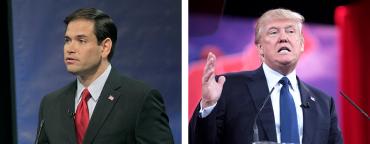
The news of Fidel Castro’s death has ended one chapter and opened up another in Cuban-American relations and Florida politicians -- part-time resident and President-Elect Donald Trump and U.S. Sen. Marco Rubio -- are prepared to take steps to move forward on relations with the Caribbean nation.
Many Republicans in Washington believe easing up on regulations with the nation would not be the right move to make. The U.S. government has eased up on relations with Cuba during President Barack Obama’s last term, much to the GOP's dismay.
Late in his presidential campaign, Trump vowed to take a hard-line approach on Cuba, vowing to roll back President Barack Obama’s normalization with the nation unless its leaders opened up the possibility of religious freedom and freed its political prisoners.
While Trump himself has not said what his specific approach would be in regards to Cuba, his advisers and top staffers have said he will absolutely reverse policy enacted under Obama.
"Repression, open markets, freedom of religion, political prisoners -- these things need to change in order to have open and free relationships, and that's what President-elect Trump believes, and that's where he's going to head, " Trump’s new chief of staff Reince Priebus told Fox News Sunday.
Trump adviser KellyAnne Conway agreed, saying Trump would have conversations with Cuban officials, but would take a different approach and would prioritize freeing political prisoners and promoting more democratic ideals.
"To the extent that President Trump can open up new conversations with Cuba, it would have to be a very different Cuba," she said on ABC’s “This Week.”
On Sunday, Rubio appeared on CBS’ “Face the Nation” and expressed his hopes for Cuba’s transition to a more democratic form of government, but that the American government should ensure
“There is going to be a generational leadership change in Cuba over the next five to 10 years -- hopefully sooner,” he said. “And we need to ensure that our foreign policy towards Cuba incentivizes and makes it easier for there to be a democratic transition.”
Rubio, whose parents immigrated to the U.S. in the late 1950s, said he would like to see the country reform some of its policies now that Castro is gone. Supporting a free press and independent political parties were among some of Rubio’s hopes for the country.
Rubio has been particularly critical of relations between Cuba under Obama.
“I am not against changes in U.S. policy towards Cuba. I just want to make sure that those changes are reciprocal, that they’re reciprocated by the Cuban government,” Rubio explained. “That was not part of what President Obama did. And I want to make sure that they are the kinds of things that help create a pathway towards democracy in Cuba. That’s how I would examine our foreign policy towards Cuba.”
Reach reporter Allison Nielsen by email at allison@sunshinestatenews.com or follow her on Twitter: @AllisonNielsen.


